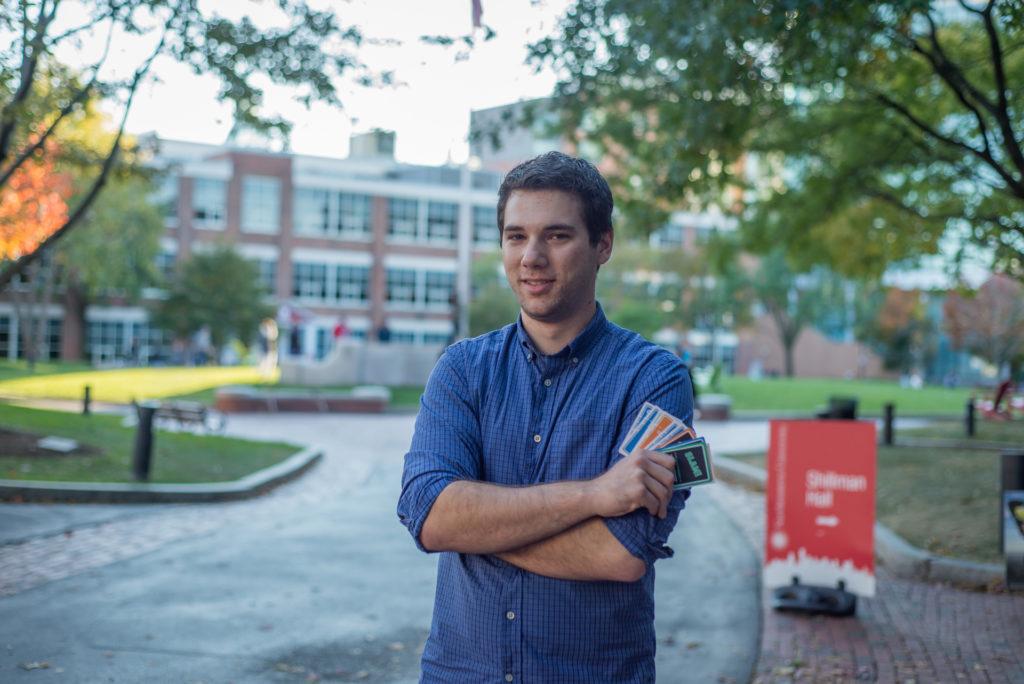By Elise Harmon, news editor
A Kickstarter campaign started by junior game design major Jordan “JJ” Surkin has surpassed its fundraising goals, ensuring Surkin will have the funding to print 500 copies of his role-playing card game, Alibi.
Surkin developed the game as a project in his Rapid Idea Prototyping for Games class. This semester, he decided to take the idea and make it into an experiential co-op.
“Alibi is a party game that takes elements from ‘Whose Line is it Anyway?’ and Cards Against Humanity and puts it all in the scene of Judge Judy’s courtroom,” Surkin said. “So it kind of gets a little crazy and chaotic and allows players to just make up crazy stories and have fun with it.”
For his co-op, he perfected the design, researched the gaming market, printed prototypes and started the Kickstarter campaign to raise funds. On Oct. 27, the Kickstarter met its $5,400 goal, four days before the Oct. 31 deadline.
The game is targeted at college-aged players and can be played by three to five people. One person is the prosecutor and the others are suspects.
According to the game’s Kickstarter page, “One player is The Prosecutor; they are the judge, jury, and executioner. They are also the scorekeeper. The Prosecutor’s job is to interrogate each suspect and dissect their alibis to determine who is most guilty. The remaining players are the suspects. The suspects are trying to make sure they don’t have the most points of guilt at the end of the game. The player with the most points of guilt loses, the others win.”
Each player gets a hand of three cards, and the prosecutor asks everyone where they were at each hour of the day. Players must play alibi cards to explain their whereabouts. Then, suspects must come up with stories to convince the prosecutor that their alibi makes sense.
“It’s technically a role-playing game, so [players] create a story out of ‘Alibis,’” Surkin said. “They can take it in whatever direction they want to, whether they’re donating kidneys and going on a drinking spree or going to a birthday party in the park and no one sees them there.”
According to Craig Bettinson, the director of cooperative education for the College of Arts, Media and Design (CAMD), students have two options when they’re creating their own co-op in CAMD: self-directed co-op, where a student finds a job independent of the co-op database; and experiential co-op, where they’re working on a personal project the whole time. Surkin is pursuing an experiential co-op.
“Primarily, [experiential co-ops] have been music or some kind of small business development,” Bettinson said. “We don’t have many of them, just one or two a term, really, but it’s a nice opportunity for a student that has an idea.”
Surkin launched the Kickstarter campaign on Oct. 1. Over 75 people have contributed to the campaign so far, and he’s surpassed his goal. To reach his stretch goal of printing game cards on higher-quality cardstock, Surkin will have to raise over $3,000 more by Oct. 31.
Most of the backing, Surkin said, came from his advertising to friends and family on Facebook. Several donations came from posts on Reddit, Twitter and through Kickstarter itself.
Jacob Van Heemst, a friend of Surkin’s and a junior game design and computer science student, was one of the backers of the project. He helped Surkin during development by helping fine-tune gameplay.
“I think it’s pretty fun,” Van Heemst said. “It has to do a lot with people who have a creative sense of humor and know how to make up things on the fly.”
He said he donated around $50 to support Alibi, buying him four decks of the game.
“I want to support him, and I also have a few friends back home who I’ve played Cards Against Humanity with who are going to law school, so I thought they would get a kick out of it,” Van Heemst said.
Photo by Scotty Schenck















